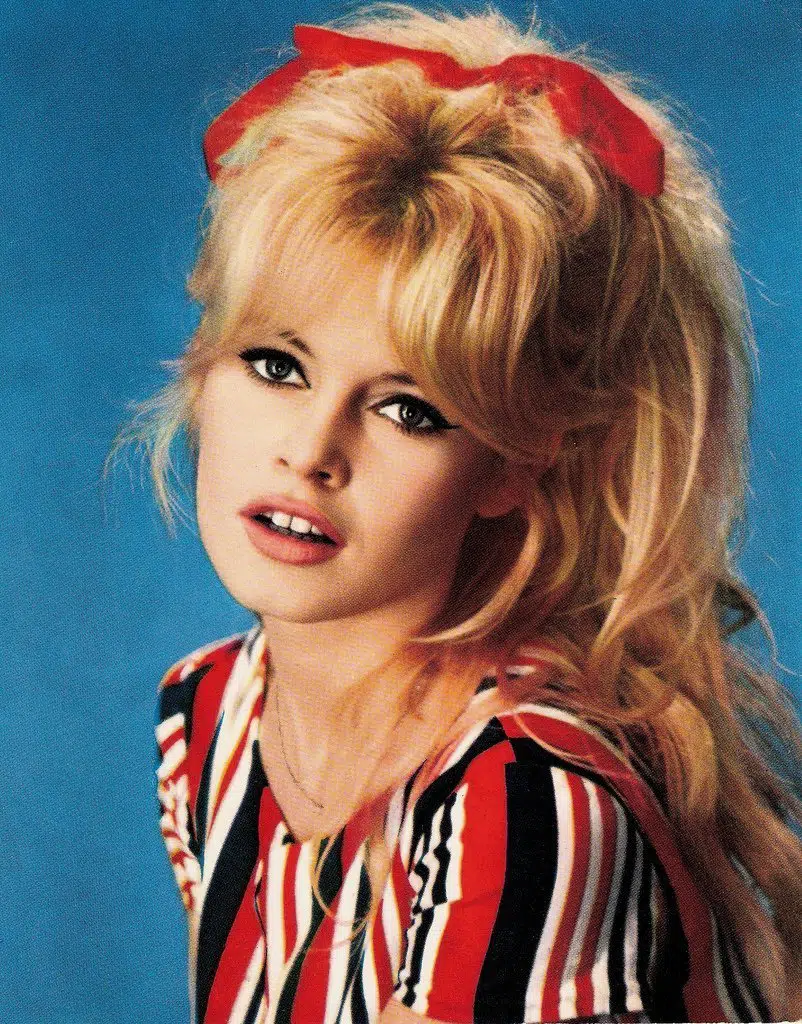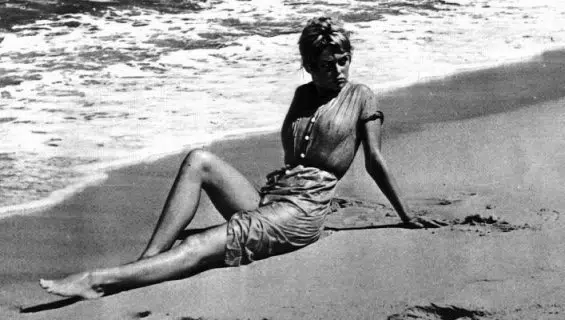“I am really a cat transformed into a woman… I purr. I scratch. And sometimes I bite.” Brigitte Bardot – icon, activist, bigot and just possibly the future president of France. By Steve Morrissey
In a recent poll of the Sexiest Movies Stars by the film magazine Empire, Brigitte Bardot squeaked in at number 98. Down the list maybe, but she was nestling next to Thandie Newton, one of the undisputed knockouts of our time. And that isn’t bad for a woman who hasn’t made a film in 40 years.
Which raises the question: why is she still so fondly remembered? It’s not her ageless good looks. Bardot has always refused the surgeon’s knife and at 76 look less like a film star, more like a bag lady. She’s got a mouth like one too, making no attempt to keep her often inflammatory remarks to herself.
It’s not the acting – “I started out as a lousy actress and have remained one,” she once famously said.
But in her prime Bardot had better lips than Angelina Jolie, sexier curves than Scarlett Johansson, more sass than Cameron Diaz and an alluring aloofness that even Uma Thurman cannot match.
Smoking, you could say. But the original sex kitten’s claim to everlasting fame rests on more than just her looks: Bardot changed womanhood for ever.
Before Bardot we were in the era of Monroe – all artifice and structure and feminine wiles. Along with the helmet hair, the careful lipstick and the dresses nipped in just so came the breathy voice and the girly giggle, the whole thing a towering meringue of deceit, beneath which lay an intelligent woman who had played dumb so long it had unhinged her.
Then came Bardot, and the tousled hair, bedroom eyes, airbed pout and languid limbs which seemed to say – Here I am boys, no artificial colours or flavouring, what you see is what you get.
What you got was gorgeous of course, but it was also something new – in an age before teenagers had even been properly defined, Bardot was wearing little gingham bikinis and loose clothes, her hair falling provocatively from its pins in a style which has never been done as convincingly since. Bardot wasn’t adult in the old way (work, kids, duty), she was adult in the new way (fun, freedom and a licence to fool about), the accent on youth, not maturity, sex not security. It’s the way we all still are, or a lot of us would like to be.
Bardot became an international film star aged 21 in 1956. She was the only French star who could really open a film in America, before or since. The French president De Gaulle called her “the French export as important as Renault cars”. The writer Simone de Beauvoir declared her the most liberated woman of post-War France and “dangerous in the eyes of society.”
The Americans agreed. In Philadelphia and Cleveland, Providence and Memphis, cinema managers were arrested for showing the film that made her name, And God Created Woman.
All of which obscures an interesting and often overlooked aspect of Bardot’s fame – her films stink. Apart from Louis Malle’s Vie Privée and Jean-Luc Godard’s Le Mépris there’s virtually nothing of merit. A look at her back catalogue reveals fluffy nothings or full-throated yodelling turkeys. Even And God Created Woman, the film that single-handedly created the international appetite for what is now called World Cinema, is virtually unwatchable, Bardot apart.
But Bardot’s films aren’t the reason why she became popular and has stayed popular. It was her refusal to play the game, to be the old fashioned little lady.
The turning point came on her 26th birthday in 1960 when she tried to commit suicide. The pressure of fame, the constant mobbing by fans and paparazzi (see the virtually biographical Vie Privée for more details), the headline marriages and affairs and divorces simply became too much. “I have no private life at all. I am a hunted woman”, she said and she hit the release valve by swallowing a bottle of pills and slitting her wrists.
After she recovered, she was never quite the same again. Never a lover of the limelight, she turned her back on the mad grasp for fame and started doing just what she wanted.
She tried to retire from acting, but was lured back with promises of “one last hurrah”, in films which – like the others – squawked.
In 1967 she recorded the song Je t’aime… moi non plus with Serge Gainsbourg, then forced him not to release it (history reveals she got her way. Gainsbourg had the international hit with Jane Birkin).
Eventually in 1973, aged 39, she decided once and for all that she would retire, after yet another flop with the film Don Juan.
Paris-born and French to her cuticles, Bardot has never wanted to live anywhere else or be anything other than French. She could have gone to live in Hollywood but didn’t. She refused a seven year contract with Warner Bros in fact, preferring to return to her homeland.
Having turned her back on films, she then proceeded to turn her back on humans too. “I gave my beauty and my youth to men. I am going to give my wisdom and experience to animals.” she said on retiring.
Her campaigns for animals – her Foundation fights animal cruelty in many forms – has won her admirers but her pronouncements on immigration into France, Muslim immigration in particular, have shown Bardot in a different light.
If we were being charitable we might excuse Bardot’s comments as the utterances of a woman who is simply proud to be French, too fiercely proud maybe but with impulses which are basically noble. Or perhaps not. Being married to a former advisor to the Front National certainly doesn’t suggest Bardot secretly works shifts at an immigrant shelter.
But even so in a world of airbrushed public figures there’s something refreshing in her stuff-you attitude. “I have the courage of my convictions” she says. “I don’t beat around the bush and I am about the only one who doesn’t in this bloody country”.
The Ecology Alliance seems to think so, and is reportedly trying to persuade Bardot into becoming their candidate in the 2012 presidential elections.
Will she stand? Probably not – politicians need to be good actors and Bardot has admitted she’s not. But it would make a great Hollywood finish to any movie about her life, rumours about the making of which are constantly in circulation.
“A film about me?” she told a French radio station recently. “Nobody would be able to pull it off.”
I am an Amazon affiliate
© Steve Morrissey 2011

